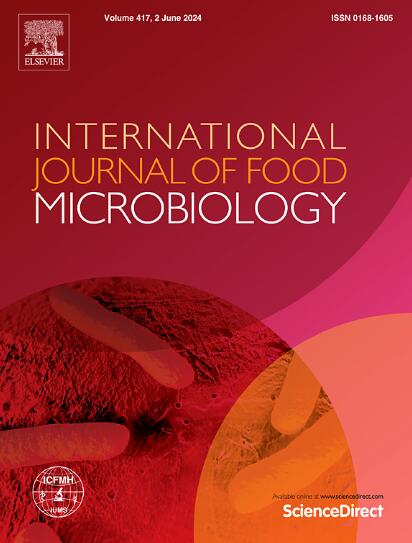Bioaugmentation with Zymomonas mobilis modulates microbial succession and enhances volatile profiles in strong-flavor Daqu fermentation
IF 5.2
1区 农林科学
Q1 FOOD SCIENCE & TECHNOLOGY
International journal of food microbiology
Pub Date : 2025-05-21
DOI:10.1016/j.ijfoodmicro.2025.111275
引用次数: 0
Abstract
The advancement of novel microbial resources is pivotal for improving traditional Daqu fermentation in Chinese strong-flavor Baijiu. Although Zymomonas mobilis (Z. mobilis) exhibits potential in other alcoholic beverages, its application in Baijiu remains unexplored. This study demonstrates that Z. mobilis fortification significantly enhances Daqu quality by restructuring microbial communities and modulating enzymatic activity. Key findings include: (1) A dominance shift from Bacillus to Kroppenstedtia (53.4 % abundance), enhancing starch liquefaction and Maillard reaction-driven aroma formation; (2) Increased esterification power (+16.7 %, P < 0.05), fermentation power (+34.8 %, P < 0.01), and total volatile compounds (+28.7 %, P < 0.01), including critical esters (e.g., methyl tetradecanoate +64.9 %); (3) PICRUSt2 analysis revealed upregulated enzymes (e.g., ethyl acetate synthase, EC 2.3.1.84, +42 %) promoting ethanol and ester synthesis. Co-occurrence networks further indicated simplified microbial interactions but enriched functional genera. These results establish Z. mobilis as a dual-action modulator, improving Daqu through microbial restructuring and enzymatic activation. This study provides the first evidence for Z. mobilis application in Baijiu, offering a novel strategy for optimizing traditional fermentation processes.

在浓味大曲发酵过程中,利用活动单胞菌进行生物强化可调节微生物演替,提高挥发物谱
新型微生物资源的开发是改进传统白酒大曲发酵工艺的关键。虽然活动单胞菌(Z. mobilis)在其他酒精饮料中显示出潜力,但它在白酒中的应用仍未开发。本研究表明,强化黄芪可通过重组微生物群落和调节酶活性显著提高大曲品质。主要发现包括:(1)从芽孢杆菌到Kroppenstedtia的优势转移(丰度为53.4%),促进了淀粉液化和美拉德反应驱动的香气形成;(2)提高酯化率(+ 16.7%,P <;0.05),发酵力(+ 34.8%,P <;总挥发性化合物(+ 28.7%,P <;0.01),包括关键酯(例如,十四酸甲酯+ 64.9%);(3) PICRUSt2分析显示,促进乙醇和酯合成的酶(如乙酸乙酯合成酶,EC 2.3.1.84, + 42%)表达上调。共生网络进一步表明微生物相互作用简化,但功能属丰富。这些结果表明,草霉是一种双作用调节剂,通过微生物重组和酶活化来改善大曲。本研究为酒霉在白酒中的应用提供了第一个证据,为优化传统发酵工艺提供了一种新的策略。
本文章由计算机程序翻译,如有差异,请以英文原文为准。
求助全文
约1分钟内获得全文
求助全文
来源期刊
CiteScore
10.40
自引率
5.60%
发文量
322
审稿时长
65 days
期刊介绍:
The International Journal of Food Microbiology publishes papers dealing with all aspects of food microbiology. Articles must present information that is novel, has high impact and interest, and is of high scientific quality. They should provide scientific or technological advancement in the specific field of interest of the journal and enhance its strong international reputation. Preliminary or confirmatory results as well as contributions not strictly related to food microbiology will not be considered for publication.

 求助内容:
求助内容: 应助结果提醒方式:
应助结果提醒方式:


